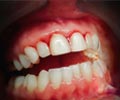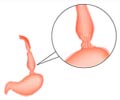People with a history of gum disease and tooth loss are at a higher risk of developing esophageal and Gastric Cancer. Bacteria and Oral Hygiene may be the cause
Highlights :
- There is a link between gum disease and esophageal and gastric cancer
- Nitrate causing bacteria and ‘red complex’ periodontal pathogens may be responsible for the link
- History of periodontal disease was associated with 43% and 52% increased risk of esophageal cancer and gastric cancer
Read More..
What is the Focus of the Study?
A group of researchers from the Harvard T.H Chan School of Public Health, in Boston, USA, carried out this study to find the relationship between gum disease and tooth loss with different cancers. Periodontal disease is generally an infection that affects the gum that holds the teeth in place. A sticky film of bacteria builds up on the teeth and hardens.Previous reports indicating the relationship between periodontal disease and tooth loss with esophageal and stomach cancer were inconsistent.
Thus, researchers from Harvard carried out a study of data on patients over decades of follow up.
Esophageal cancer is cancer that arises in the esophagus. It is the food pipe that connects the throat and the stomach.
Stomach cancer is cancer that generally begins in the mucus-producing cells that line the stomach.
The research doctors compared the data of :
- 98,459 women from the Nurses’ Health Study (1992-2014)
- 49,685 men from the Health Professionals Follow-Up Study (1988-2016)
What are the Results of the Study?
There were 199 cases of esophageal cancer and 238 cases of gastric cancer during 22-28 years of follow up.History of periodontal disease was associated with 43%, and 52% increased risk of esophageal cancer and gastric cancer, respectively. People with tooth loss had higher chances of 42% and 33% of developing esophageal and gastric cancer, compared to people with no tooth loss.
Patients with a history of periodontal disease and no tooth loss or one or more lost teeth were found to have an equal increased risk of 59% of esophageal cancer when compared with no disease and no tooth loss patients.
What are the Possible Reasons for this Association?
Authors suggest possible connections between oral bacteria and esophageal and gastric cancer such as:- Gram-negative bacteria such as Tannerella forsythia and Porphyromonasgingivalis are associated with risk of esophageal cancer. They are members of the ‘red complex’ of periodontal pathogens.
- Poor oral hygiene and periodontal disease can promote the formation of nitrosamines. These endogenous nitrosamines through nitrate causing bacteria are known to cause gastric cancer.
Further, prospective studieswould help understand the oral microbiome and identify specific bacteria responsible for the connection. These additional findings could help identify non-invasive biomarkers and help identify individuals who are at a higher risk for these cancers.
Reference :
- Periodontal disease, tooth loss, and risk of oesophageal and gastric adenocarcinoma: a prospective study - (https://gut.bmj.com/content/early/2020/06/30/gutjnl-2020-321949)
Source-Medindia
















